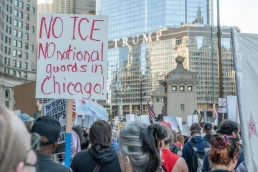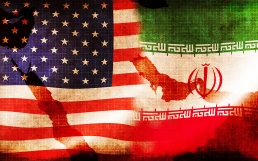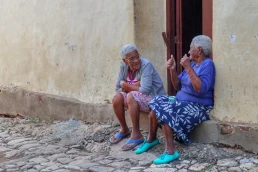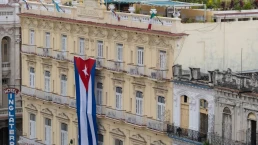Over thirty people, including children, were kidnapped, while the rest of the residents had their zip ties cut off and were sent back into their destroyed homes.
By Danaka Katovich
On September 30th, in the middle of the night, hundreds of men dressed in tactical military gear descended upon an apartment building in Chicago’s South Shore. Blackhawk helicopters were circling above. The agents threw flashbangs and began kicking down front doors. When residents looked out their windows, they saw these masked men holding guns with lights fastened to them, pointed at their homes and shining into the windows. Children awoke to the flashbangs and the commotion. Along with their parents, they were zip-tied and thrown outside. Every resident of the 130-unit building was separated by race and loaded into trucks, where they were held for hours. Over thirty people, including children, were kidnapped, while the rest of the residents had their zip ties cut off and were sent back into their destroyed homes. Children’s stuffed animals were found in the dumpsters, mattresses were overturned, and windows were smashed.

This sounds like an incident from one of the United States’ many endless wars around the world, where special ops were sent to raid homes – leaving trauma and destruction in their wake. Chicagoans, especially on the southside, are no strangers to state violence and neglect, but this was a more dramatic iteration that stole headlines all over the country.
When asked about the raid in South Shore, U.S. Chief Patrol Agent Gregory Bovino said, “No rights have been violated today” – a common phrase turned by the same people with the power to determine which “rights” we are really entitled to in the first place.
Around the same time of this raid, Conde Nast voted Chicago the “Best Big City in the U.S.” for the ninth year in a row. His award is being waved in the face of the Trump Administration in response to their attacks on the city – insinuating that crime and violence can’t be that bad if the country’s taste makers like it here so much. But Chicago does have problems – and they flow from the same sources of power that tout their attacks on immigrants and allow military helicopters to descend onto a neighborhood on the southside. An example is the increasing police budgets under Rahm Emanuel and the following closures of over 50 public schools on the south and west sides of the city. Their “solution” to our cities’ problems is the problem itself – but the people that run this country know that well because their “solution” to our “problem” also happens to be lining their pockets: unfettered Pentagon spending increases at the cost of disinvestment to the people.
The South Shore neighborhood “had the highest number of eviction filings in Chicago from 2015-2019.” Journalists reporting on the aftermath of the raid admitted they couldn’t tell how much of the damage had resulted from the raid, and how much had been present before. The building’s elevator didn’t work, and the stairwell smelled foul, the stench getting worse the further that people went inside.
There is a 30-year difference in life expectancy for Chicagoans between the north and south sides – people in Streeterville average 90 years, but only 60 years in Englewood.
People living in dilapidated buildings like these, whether in Chicago or elsewhere, who struggle to pay rent and afford healthcare for their families must, at some point, ask themselves why they struggle so much in a country and city that touts itself as doing so well economically. Politicians living comfortably in DC would like poor US citizens (and everyone else) to blame their struggles on their immigrant neighbors. However, that doesn’t make much logical sense when everyone in the South Shore apartment, undocumented or not, was violently taken from their homes in the middle of the night. These ICE raids make clear that the ruling class’s disdain goes far past the immigrant community. It includes anyone who lives alongside them, and anyone who dares to care about them – as we’ve seen protestors demanding transparency shot at and arrested at the Broadview detention facility.
Chicago remains one of the most segregated cities in the U.S. Any investment in social welfare programs would benefit the poorest in Chicago, who disproportionately are Black and Brown people on the south and west sides of the city. Every cut to social spending also disproportionately harms Black and Brown Chicagoans. Trump’s “Big Beautiful Bill” kicked thousands of Chicagoans off Medicaid and food stamps and funneled that money into ICE – the same agency terrorizing the southside now.
Mayor Brandon Johnson, who is from and still resides on Chicago’s west side, has articulated this point well: When we invest in people, crime goes down. When we invest in education, housing, mental health, and healthcare, our city is better off. Investing further into an ever-inflating police budget doesn’t reduce crime – it takes money away from the programs that actually do. This isn’t just rhetoric; it’s proven. Chicago’s crime rates hit a historic low this summer – before ICE started throwing smoke bombs at people trying to grocery shop and shooting pepper bullets at pastors – which are also common scenes of Trump’s escapades in our city.
The obsession with investing in the policing budget locally is a trickle-down effect from the federal policy of constant investment in the Pentagon budget. It’s also a microcosm of deliberately misplaced priorities that harm working-class people all over the country. Our politicians – Republicans and Democrats alike – have approved increasing the Pentagon budget year after year, to the point where it is nearing one trillion dollars annually. Half of that money goes to private contractors like Lockheed Martin and Boeing, and lots of that money seemingly goes missing – the Pentagon has never passed an audit. Not coincidentally, the companies that benefit from the trillion-dollar military budget are also some of the biggest spenders on lobbying and campaign contributions to the very same politicians who vote in favor of their government contracts every year! 90% of Lockheed Martin’s revenue comes from government contractors, rendering their business model completely impossible without endless war spending on behalf of the United States.
The ruling class’s message to the working poor is clear: we have money for a lot of guns, but we have no money for your butter. If you end up homeless because of our greed, we will send the military (paid for with money we steal from your taxes) to arrest and harass you. If you’re a citizen, we will blame your condition on immigrants, but you will be thrown in the trucks by men with guns, too.
The people who are suffering under disinvestment are the ones considered by the ruling class to be criminals – not the actual looters running the weapons industries who, with support from politicians, have shaped our economy solely around war and militarism.
It is no surprise that a country that only invests seriously in war would sic its military personnel on its own people. They tell us it’s a remedy to crime, not because they really think so, but because they want to keep the war industry happy so they can stay in office, so they can get a board seat one day, and so on.
What happened in Chicago is likely to happen everywhere if we don’t stop it now. It is the natural trajectory of the violent path the Trump Administration is set on. In the short term, solidarity and rapid response teams to resist the kidnapping of our neighbors are a good first step. In a decent society, people wouldn’t have to stand on corners and blow whistles to stop workers from being kidnapped by the state. If we don’t want to live in a country that allows militarized immigration officers and the military itself to occupy our cities and roam our streets, we have to reckon with something a lot bigger: an economy centered around war and violence, instead of around people. It is fundamental that we reject the notion that in the “richest country in the history of the world,” we don’t have enough for people to live in dignity. It is critical that we embrace the values that will lead us to divest from war and policing and invest in things that actually serve the people.
Danaka Katovich is CODEPINK’s National Co-Director. Danaka graduated from DePaul University with a bachelor’s degree in Political Science in November 2020. Since 2018, she has been working towards ending US participation in the war in Yemen. At CODEPINK, she oversees all advocacy campaigns and facilitates our local organizing in the Midwest and in Europe. Her writing can be found in Jacobin, Salon, Truthout, CommonDreams, and more.
Recent Posts
The Iranian Trap: Neither Military Action Nor Nuclear Negotiations Can Solve Trump’s (and Israel’s) Conundrum
February 16, 2026
Take Action Now After a failed regime-change strategy and an increasingly risky military buildup, the Trump administration turns back to nuclear…
Suffocating an Island: What the U.S. Blockade Is Doing to Cuba
February 16, 2026
Take Action Now Electric motorcycles are Cuba’s response to the fuel crisis.By Medea Benjamin Marta Jiménez, a hairdresser in Cuba’s eastern city…
For Trump and Rubio, Colonizing Cuba Is Not About Freedom—It’s About Their Own Egos
February 15, 2026
Take Action Now For Trump, regime change in Cuba will cement his legacy. For Rubio, it will mark the culmination of his childhood dream. In their…
Trump’s Concentration Camp Build-Out Includes Nearly $40 Billion for Warehouse Conversions
February 14, 2026
Take Action Now “Germany’s concentration camps didn’t start as instruments of mass murder, and neither have ours,” wrote talk show host Thom…




